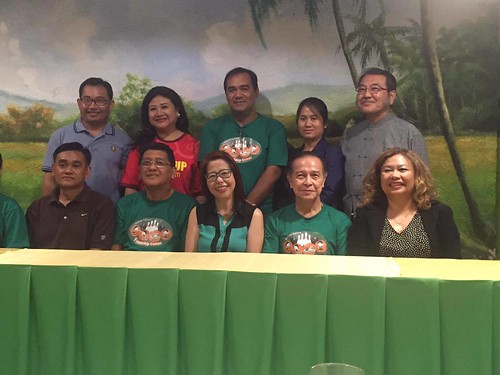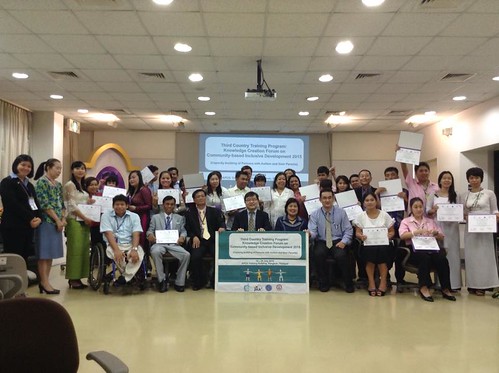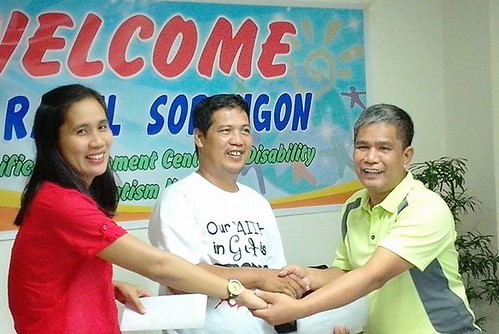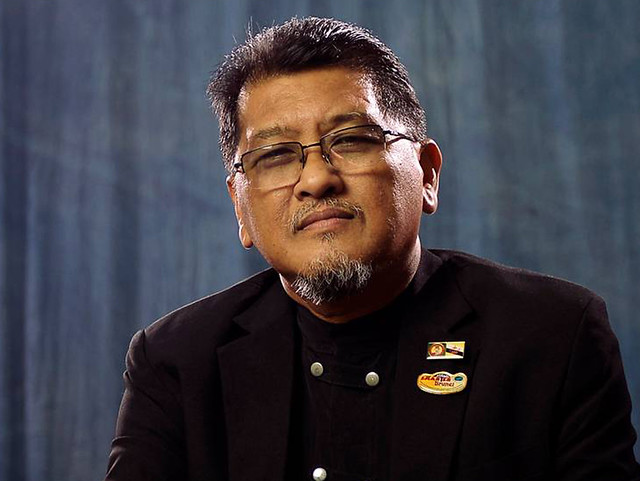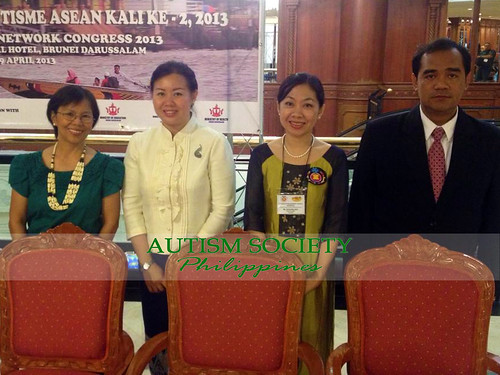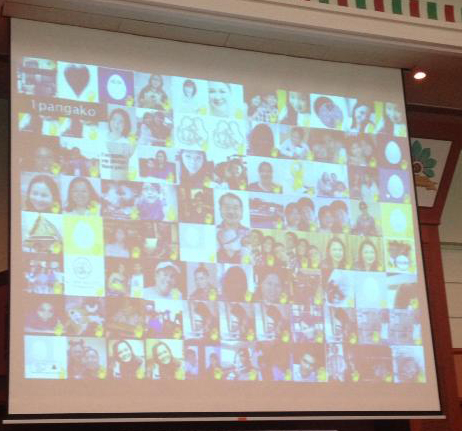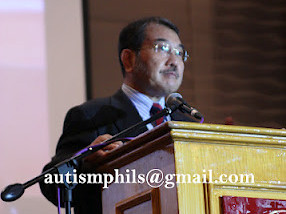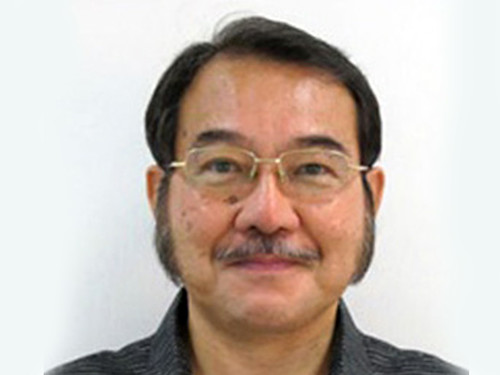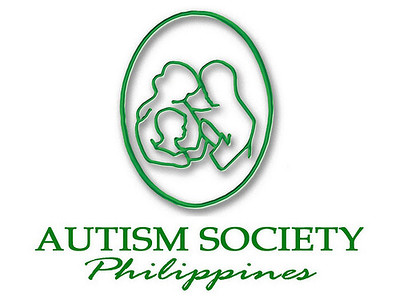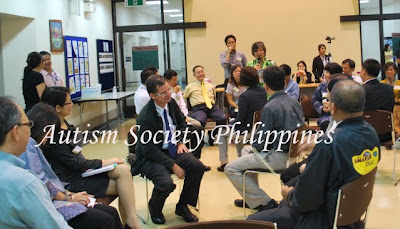By Dang U. Koe, ASP Chair Emeritus
Holistic curriculum exclusively for autism that is local, affordable, accessible and inexpensive to ensure sustain-ability throughout the lifespan of individuals with autism.
ASEAN Autism Network (AAN) serves as a platform for autism-related family support groups of each Association of South East Asian Nations (ASEAN) member country to collaborate, cooperate, coordinate and unite in developing strategies and intervention programs that will be non-discriminatory in support of families, including those economi-cally challenged. More importantly, the extended family structure on which the ASEAN community is based will remain the core of any developmental program and strategies.
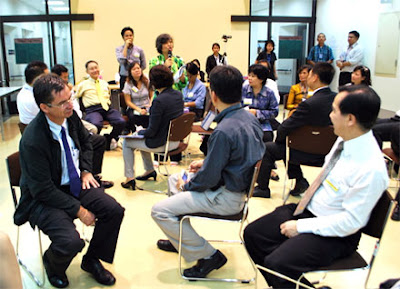 |
| ASP Laguna Chapter President, Riza Cansanay (in green) in a sharing part of the Work and Play Program |
ASEAN Autism Network Member States convened last December 2010 in Bangkok, Thailand for the first AAN Workshop and Congress. The event was organized by Asia Pacific Development Center on Disability (APCD), in collaboration with Japan International Cooperation Agency (JICA), the Association of Parents of Thai Persons Autism (AU Thai) and Khun Poom Foundation.
Philippine representatives from Autism Society Philippines, Grace Adviento (ASP-National President), Ranil Sorongon (Executive Director) and Riza Cansanay (ASP La¬guna Chapter President), joined 300 representatives of Family Support Group Organizations from Brunei Darussalam, Cambodia, Indonesia, Lao People’s Democratic Republic, Malaysia, Myanmar, Philippines, Vietnam, the host country Thailand, and a special participant from Japan.
One of the organizers, APCD, is a regional center on disability and development established in Bangkok which has been endorsed by the United Nations Economic and Social Commission for Asia and the Pacific (UNESCAP) as a regional center for its Biwako Millennium Framework for Action towards an Inclusive, Barrier-free and Rights-based Society for Persons with Disabilities in the Asian and Pacific.
The Vision and Mission of the ASEAN Autism Network
An approach that surrounds the extended family structure keeps true to the ASEAN spirit, and will at the same time provide a strong foundation for a truly inclusive and autism-friendly ASEAN community.
AAN visualizes an inclusive, rights-based and autism-friendly ASEAN community. Its mission is to support, assist, facilitate and en¬hance autism-related family support groups in collaboration with other stakeholders in the ASEAN region and globally.
Its main objectives are:
1. To educate, develop and give opportunities for an autism-related family support groups.
2. To empower the support groups and the individuals with autism in the ASEAN region.
3. To promote, encourage and facilitate evidence-based research initiatives and developments.
4. To provide, exchange and disseminate information on autism related issues.
5. To ensure the promotion and advocacy of technical and other assistance to PWA and families.
6. To develop a collaborative partnership and close working relationships with other agencies.
7. To undertake other tasks in relation to autism-related family support groups of each member country as determined by the general assembly.
Why create an ASEAN Autism Network?
Since “Family Comes First” is especially true for the member countries of the ASEAN, each member plays an important and influential role in the family and in the ASEAN community. It is the interdependence and loyalty among these family members that the ASEAN community survives and thrives on.
The family unit is comprised of an extended family, parents, sibling, grandparents, cousins, and so on. With this in mind, it is necessary to appreciate the importance of empowering the families to take the lead in nurturing, caring and supporting individuals with autism.
This is due to the ever changing faces and priorities of the professionals, politicians, teachers and therapist involved. But family remains forever. It is therefore the family’s right and responsibility to take charge in their child’s intervention, development and future.
Hence, having realized the need of creating and developing an autism movement among neighbouring autism-related family support groups, ASEAN Autism Network (AAN) was established.
The first AAN workshop realized the commonalities in the issues, concerns and challenges encountered by most of the AAN State Members: (1) the lack of the current statistics of people with autism, (2) existing local laws for persons with disabilities, (3) lack of services and service providers, (4) support from the government, (5) funding and (6) low awareness of autism.
Declaration of the ASEAN Autism Network
Here are the collective statements of AAN Member States:
1. Various efforts on autism made by relevant stakeholders in the ASEAN region are appreciated to promote understanding of persons with autism and their family members.
2. Central and local governments are encouraged to develop and support any initiative on autism, particularly to establish and strengthen self-help groups/organizations of persons with autism and their family members.
3. Health, education, livelihood, social and empowerment components in the context of community-based inclusive development are critical among persons with autism and their family members.
Therefore, ASEAN Member States and multi-stakeholder collaborations are essential in this regard.
AAN State Members also appeal to the Governments of ASEAN Member States and relevant stakeholders to consider the following recommendations to strengthen the autism movement in the ASEAN region:
1. Encourage ASEAN Member States to consider the perspective of autism in the planning, implementation and monitoring of a national policy on disability in line with the principle of the United Nations Convention on the Rights of Persons with Disabilities (CRPD).
2. Agree to the idea of establishing a new decade of persons with disabilities in the Asia-Pacific region (2013-2022) in collaboration with the United Nations Economic and Social Commission for Asia and the Pacific (ESCAP) and APCD by highlighting community-based inclusive development to empower persons of disabilities including persons with autism and their family members.
3. Agree to the idea of establishing the ASEAN Decade of Persons with Disabilities, initiated by the Government of Thailand, to mainstream disability in the development agenda.
4. Acknowledge the establishment of the ASEAN Autism Network (AAN) and recognize its importance to enhance the solidarity and unity among persons with autism and their family members, to lead the autism movement at the grassroots, national, regional and international levels.
5. Call for the ASEAN Member States and relevant partners to support the second ASEAN Autism Congress to be held in Brunei Darussalam in 2012.
“The AAN experience humbled me, as I felt fortunate for our countrymen, having ASP - one of the most active parent support organizations - making huge waves in the disability community for the past six years. This exercise also helped me experience the real spirit of “Bayanihan,” which was so alive in the group. What struck me the most was the willingness of progressive country representatives to offer assistance in training and advocacy awareness to Cambodia, Myanmar and Laos, eventhough; they too have their own local concerns,” said Grace Adviento, ASP National President.
One vital event that transpired during the workshop was the signing of the constitution by the Founding Members. ASP was elected to head the Public Relations and Information Committee. The first joint event of the ASEAN Autism Network will be the celebration of the 4th World Autism Awareness Day on April 2, 2011.
Uploaded with Permission Acknowledgement: Manila Bulletin
Family Comes first for ASEAN Autism Network


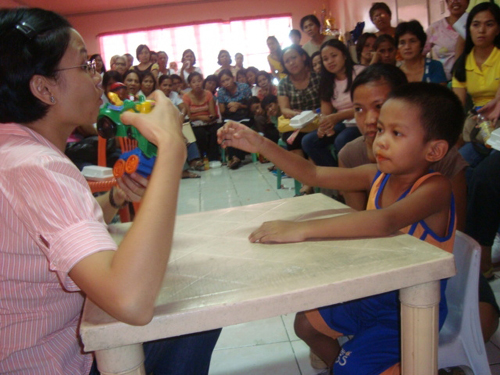
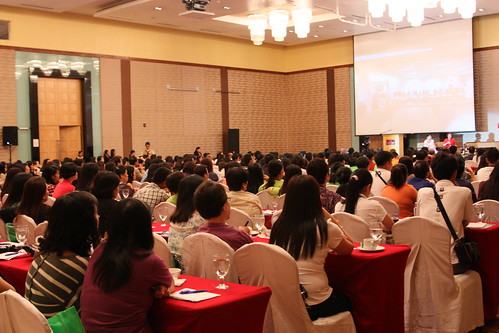

 Posted in:
Posted in: 